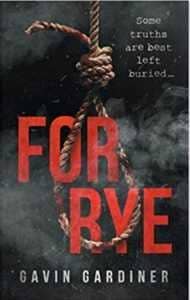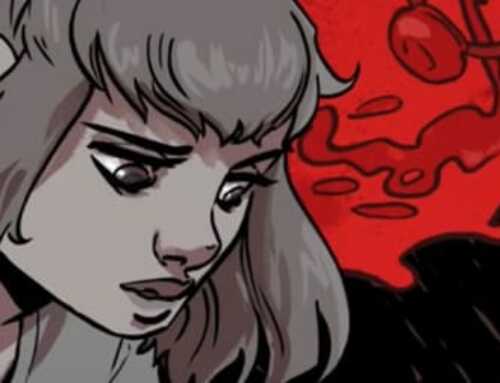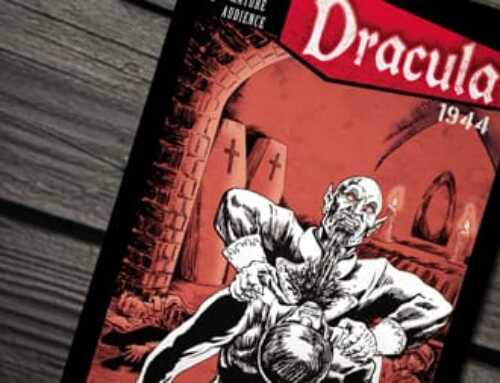 Renata Wakefield is moments from committing suicide when she receives the news that her mother has been gruesomely murdered in a way mirroring the work of prolific horror author Quentin C. Rye. So begins For Rye, the debut novel by Gavin Gardiner and perhaps the heaviest thing I’ve read in quite some time. Renata is dragged back to the small town where she grew up and where she will face off with both her personal demons and her mother’s killer. But there’s a catch– mega-famous author Quentin Rye has moved to town in order to assist with the investigation, and soon his and Renata’s lives will be forever entangled in increasingly horrific ways.
Renata Wakefield is moments from committing suicide when she receives the news that her mother has been gruesomely murdered in a way mirroring the work of prolific horror author Quentin C. Rye. So begins For Rye, the debut novel by Gavin Gardiner and perhaps the heaviest thing I’ve read in quite some time. Renata is dragged back to the small town where she grew up and where she will face off with both her personal demons and her mother’s killer. But there’s a catch– mega-famous author Quentin Rye has moved to town in order to assist with the investigation, and soon his and Renata’s lives will be forever entangled in increasingly horrific ways.The tone of For Rye is unrelentingly bleak– from Renata’s fixation on suicide to the drip-fed trauma that takes her to that place, this book does not let up. What makes it so heart-wrenching is the way Gardiner captures the subtle emotional details of child abuse. The gut-punch isn’t always the direct pain of a beating or a deranged punishment (though they are present), but the lasting emotional toll of those events and the way they change Renata forever.
Interestingly, one of the most crushing scenes to me was not a grand display of violence, but one of disdain and negligence. When Renata accidentally shatters her father’s ornate glass crucifix, she tries to atone by giving him a lovingly handmade replacement, which he doesn’t acknowledge in the slightest. Renata is crushed, and the fact that she so desperately needed the approval of her father even though he’s terribly abusive hits hard. It’s these bits that make Renata a lot more human than most characters in horror– this kind of pain is relatable in a way that the gruesome often cannot be. It’s all too fathomable.
I do have some misgivings about the initial antagonist, although these have more to do with comparison than anything else. The reveal of Sylvia Wakefield’s killer is a bit limp, but that isn’t really the point of it all so that in and of itself didn’t detract much. Spoilers ahead!
The fact that Quentin Rye is meant to be an analog for the heavy hitters of the horror genre, particularly Stephen King and the like, sometimes works against the story’s atmosphere. The problem is that it’s difficult to see this character as vile within that comparison, so he can feel a bit like a flat caricature at times, especially when professing his single-minded bent on truth in horror. In fact, that’s the majority of his on-page characterization, so when the reader fills in the gaps with preconceptions about the authors Rye is standing in for it creates a strange sort of tonal dissonance. On the one hand is Renata’s truly agonizing backstory, and on the other is the early main plot, just a bit too theatrical at times to compare favorably.
But the obvious second act plot twist brought with it the realization that there was still quite a bit of book left, and this is where things fall back down the rabbit hole and into the same pitch-black tone as Renata’s flashbacks. We watch her spiral downward into a truly disturbing villain, one born from a need to realize Quentin’s obsession with truth in art and pay back her tormentors in spades. She turns everything she’s experienced back on an innocent-if-vapid bystander who she recognizes as having the same need to impress her own father despite his cruelty– it’s troubling and grim in all the ways I wanted it to be based on the book’s early promise. From here, the book doesn’t let off until the literal last page, creating a truly unexpected and shocking third act that wonderfully subverts the well-written but expected previous beats.
Gardiner realizes that our hope and empathy for the protagonist can be weaponized and turns it against the reader with powerful results. Make no mistake, this is not a feel-good story. It is as bleak and dark as possible without straying into the cartoonish, usually fun depths of extreme horror, and that’s a thing of beauty.
Rating 9 out of 10 Rolls of Combustible Film







